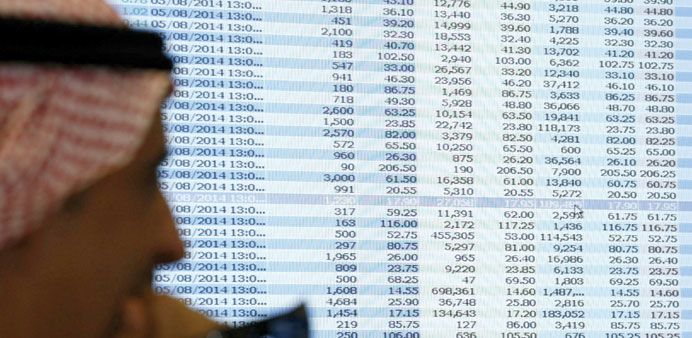The Tadawul All Share Index is the best performer among seven major gauges in the GCC this year
Bloomberg/Riyadh/Dubai
For all the optimism over the opening of Saudi Arabia’s stock market to foreigners, it will probably be several months before inflows will have an impact, according to the investment manager Ashmore Group.
The Capital Market Authority said Monday that international ownership of a single company is restricted to 49% while only institutional investors with a minimum of 18.75bn riyals ($5bn) under management will have direct access to the stock market. Money managers who have been waiting since August for the final rules have six weeks to prepare for the market opening next month.
“There will be initial excitement, but substantial flows will take at least a quarter,” Riyadh-based John Sfakianakis, the director of the Middle East at Ashmore, said by e-mail. “They need to see and understand the stocks and how the system works.”
Opec’s biggest exporter is opening a stock market that’s among the least accessible to foreigners as King Salman pushes ahead with efforts to diversify the economy away from oil.
One of the regulator’s goals in opening the market to foreigners is to be included in the MSCI Emerging Markets Index. The kingdom may account for 4% of the gauge by 2017 at the earliest, depending on the rules, Sebastien Lieblich, executive director at MSCI Index Research, said in July.
“Direct access in itself isn’t going to have the sizable impact as many of the large institutional investors are already invested in the market,” Mahmood Akbar, a Riyadh-based equity analyst at NCB Capital, said by e-mail on Monday. “It’s the upgrade to the MSCI EM index that will be the key catalyst for foreign passive flows. This depends largely on how much flexibility the MSCI index provider will be in relation to the T+0 settlement system and restrictions on foreign holdings.”
The CMA has no intention of changing the settlement cycle at the current time, it said on its website. T+0 refers to same-day settlement.
The Tadawul All Share Index is the best performer among seven major gauges in the six-nation Gulf Cooperation Council this year, rising 17% to near the highest level since November. The gauge slipped 0.4% to close at 9,751.03.
The main aim of opening up the largest Arab bourse is to attract institutional investments, CMA Chairman Mohammed al-Jadaan said at a Euromoney conference in Riyadh yesterday.
“We are not after the money, we welcome the money, but it is not our objective. What we are looking for is institutional investments,” he said. “We are not going to have floodgates of investments come June 15.”
Saudi Arabia, which previously barred foreigners from taking part in the kingdom’s initial public offerings, will now allow them to invest on a “case by case” basis, Jadaan said.
Foreign participation in IPOs will be decided “in coordination between the issuers and the CMA,” Jadaan said yesterday. “It’s up to the CMA and the market, and what the CMA feels the market needs at the time.”
Qualified foreign investors’ holdings won’t exceed 10% of the market’s value, according to the CMA’s statement. The regulator set a 5% limit for a single QFI holding in a single stock, and a 20% ceiling for QFIs. The Saudi Stock Exchange will publish ownership limits for each company.
QFIs and their clients are subject to a 5% withholding tax on dividends, the regulator said, adding that they can vote in general assembly meetings and nominate representatives to the boards of listed companies. The rules will go into effect June 1 and the market will open to foreigners June 15, the CMA said last month.
“Saudi Arabia might be a good story, but I’m not sure it’s an automatic buy, lack of liquidity might be an issue,” Win Thin, the global head of emerging-market strategy at Brown Brothers Harriman & Co in New York, said on Monday. “If you are a highly sophisticated investor and you’re really bullish on oil, this market might be a place to go.”
Oil accounts for about 90% of the kingdom’s foreign revenue, and it’s burning through cash reserves at a record pace. The 48% drop in oil prices last year has prompted the government to use reserves and borrow from domestic banks to maintain wages and investments.
The kingdom spent $36bn of the central bank’s net foreign assets - about 5% of the total - in February and March, the biggest two-month drop on record, data released last month show.
“The expectation of an avalanche of money coming in to the stock market on day one may not be reflective of realistic market expectations,” Jamal al-Kishi, chief executive officer for Deutsche Securities Saudi Arabia, said in an interview in Riyadh. The level “over time will stabilise at a level consistent with the size and scale of the Saudi market,” he said.

